This Chinese herbal chicken soup recipe never fail to perk me up whenever I feel tired or under the weather. For centuries, Chinese herbs have been used in cooking to promote general well-being, boost energy and strength and treat various body ailments. Used correctly, they not only enhance the flavor of a dish but herbs with specific curative properties may help in healing and maintaining good health.
Note: This article was first posted in Nov 2015, now updated with new photos and improved recipe.
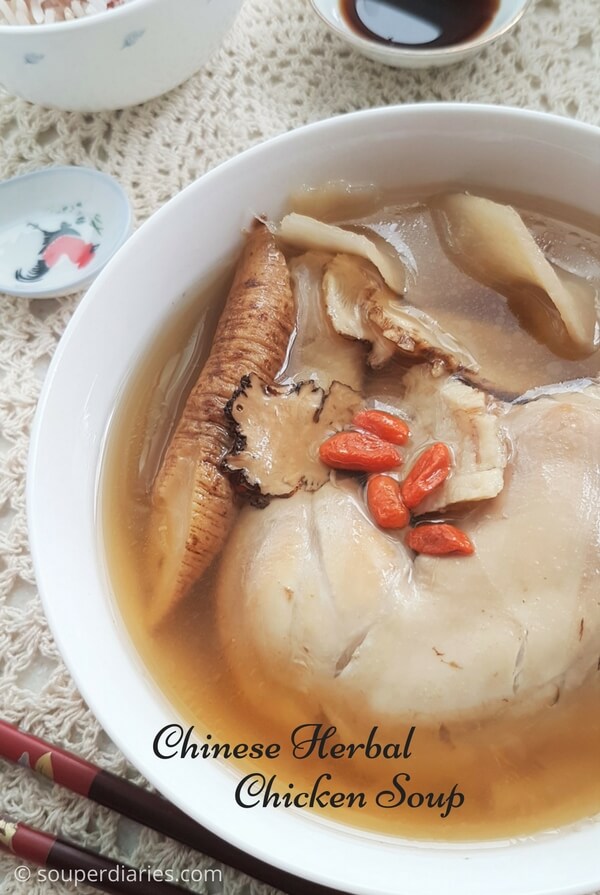
The Herbs
These are the Chinese herbs that I used for this Herbal Chicken Soup. They can be purchased from any TCM shop or even online.
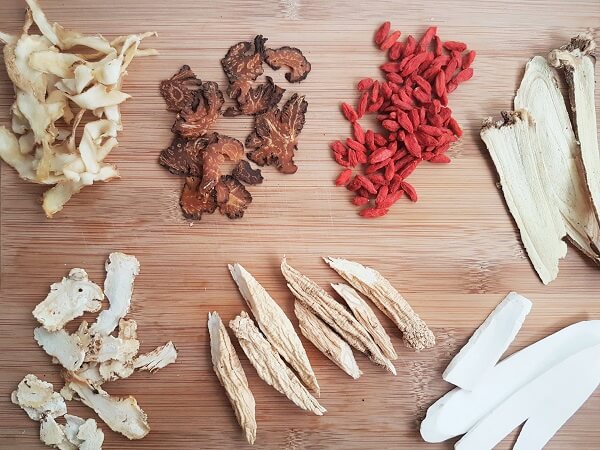
Clockwise from top left: Soloman’s Seal (Yù Zhú), Rhizoma Ligustici (Chuan Xiong), Wolfberry Seeds (Gǒu Qǐ Zǐ), Astragalus Root (Běi Qí), Dried Chinese Yam (Huái Shān), Codonopsis Root (Dǎng Shēn) and Chinese Angelica Root (Dāng Guī)
Basic herbs like goji berries (wolfberries), dried Chinese yam (Huái Shān), solomon’s seal (Yù Zhú) and dried red dates are mild and can be taken by the whole family. I prefer a stronger herbal taste in my soup so I added the rest of the other herbs and used the amount required according to a pre-packed herbal soup that I tried.
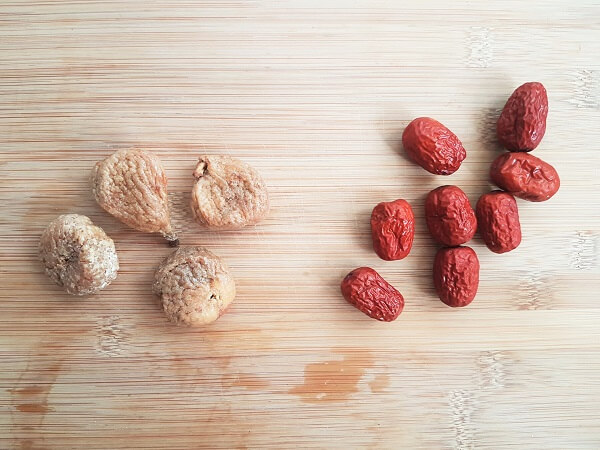
From left: Dried figs, Dried red dates
The Health Benefits of Chinese Herbs
Below is a brief description of some of the Chinese herbs used in this soup and its curative properties.
1. Dried Chinese Yam – Huái Shān (淮山)
Chinese yam strengthens the spleen and stomach to aid digestion, nourishes kidney, lowers blood sugar, promotes longevity, treats loss of appetite, body fatigue, diarrhea and other diseases
http://www.chineseherbshealing.com/chinese-yam/
2. Wolfberries – Gǒu Qǐ Zǐ (枸杞子)
Wolfberries have many nutritional values. Among them, it improves immune function, increases energy and has anti-fatigue effect, anti-cancer, improves eyesight, improves brain function and enhances learning and memory capabilities.
http://www.chineseherbshealing.com/goji-berry/
3. Soloman’s Seal – Yù Zhú (玉竹)
These slivers of curly herb are yellowish in colour and is believed to treat ailments related to the lungs and throat. It helps with dry cough, sore throat and thirst.
4. Astragalus Root – Běi Qí (北芪)
Astragalus is said to prevent and treat common colds and upper respiratory infections, and it’s usually combined with other herbs that also help support and strengthen the immune system, such as ginseng, angelica and licorice.
http://www.canyonranch.com/your-health/health-healing/healing-therapies/eastern-medicine/introduction-chinese-herbs
5. Codonopsis Root – Dǎng shēn (当参)
Main Codonopsis uses and indications include deficiency in lung and spleen, shortness of breath and heart palpitations, reduced appetite, loose stools, deficient asthma and cough, and heat diabetes.
http://www.chineseherbshealing.com/codonopsis-dang-shen/
6. Dried Red Dates – Hóng Zǎo (红枣)
Dried red dates balances qi and nourishes the blood. It also helps to improve insomnia, reduces cholesterol and protect the liver.
http://www.pingminghealth.com/article/636/chinese-dates-and-insomnia/
If you don’t have these herbs at home or don’t cook herbal soups often, buying pre-packed Chinese herbal soups will be more practical and convenient. For me, it is much more economical to buy my own Chinese herbs as I cook herbal soups from time to time. Storing them in the refrigerator will help to preserve their freshness.
The Best Soup Pot for Chinese Herbal Soups
Some Chinese herbs will react to metal so it is not advisable to cook herbal soups in metal pots. If metal pots are your only option, use stainless steel and avoid those made with aluminium, cast iron and copper. A pot with a lid is a must.
The ideal soup pots for cooking Chinese herbal soups include:
- slow cookers
- double boilers
- clay pot (my personal favorite)
The smell that fills my entire kitchen when I boil this soup is simply amazing! I just love the herbal aroma.
Since young, I’ve been told that wolfberry seeds are good for my eyesight so I try to include them in my cooking whenever I can. One of the dishes is this steamed chicken with black fungus dish.
If you don’t already know, it is standard practice to avoid taking white radish in any form within 24 hours after consuming a herbal brew or any traditional Chinese medicine. Radish have strong detoxification properties thus it will weaken and reduce the effectiveness of any herbs.
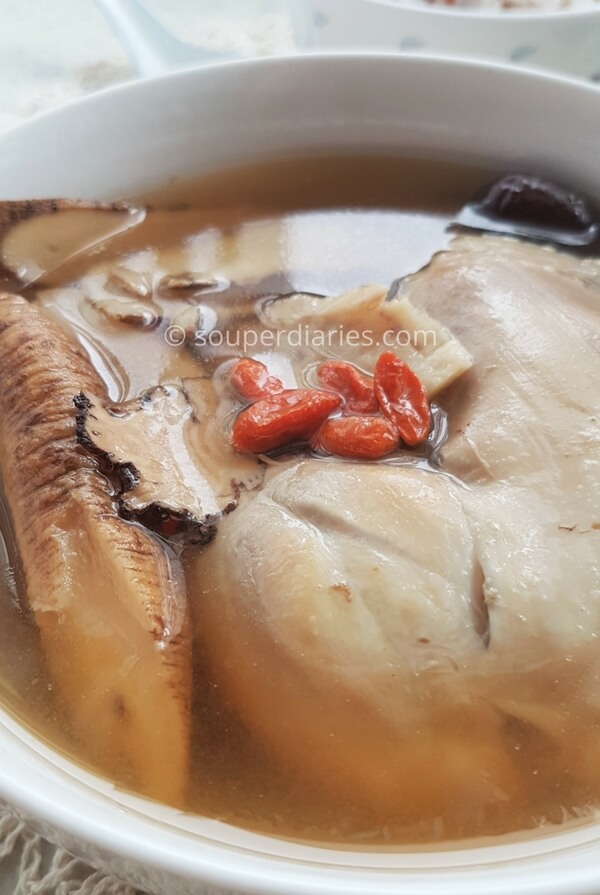
Don’t want to miss a recipe? Sign up for Souper Diaries newsletter delivered to your inbox.
Other soup with Chinese herbs:
- 500 g chicken parts - skin removed
- Astragalus Root (Běi Qí) - 20 g
- Codonopsis Root (Dǎng shēn) - 20 g
- Soloman's Seal (Yù Zhú) - 20 g
- Chinese Angelica Root (Dāng Guī) - 10 g
- Dried Chinese Yam (Huái Shān) - 20g
- Dried wolfberries - 15 g
- Dried Figs - 4
- Dried Red Dates - 8
- Rhizoma Ligustici (Chuan Xiong) - 5 pieces
- Water (just enough to immerse all ingredients)
- Salt - to taste
- Blanch chicken pieces in a pot of boiling water for a few minutes until you see the scum and dirt float up. Remove and set aside.
- Rinse all the dried herbs briefly to remove dust and dirt. Put the dried herbs and water into a claypot and bring to a boil. Once the water starts boiling, add the chicken parts.
- Lower the heat to the smallest flame and simmer for at least 1.5 hours or 2 hours the most. The chicken should be tender but not falling apart.
- Season with salt before serving.
2. Chicken on the bone is recommended for this recipe and not chicken breast as the former is more tender.
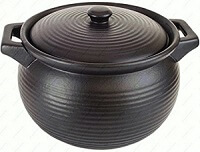
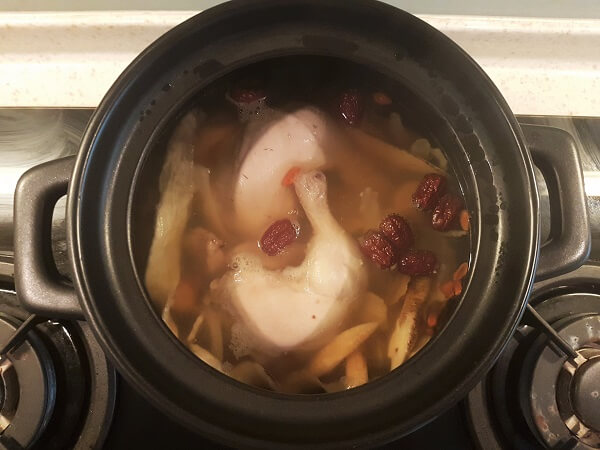
I was craving for herbal chicken soup sooooo badly (am studying in the uk) and I successfully made it all thanks to your recipe (though I spent a longggg time figuring out the herbs in the oriental mart!! Really comforting in such a cold weather ^_^ Thank you and looking forward to more amazing recipes from you 🙂
Hi Yvonne, can i omit the dried figs if i dont have them? Is there a substitute? Thank you
Yes, you can omit the dried figs if you don’t have them. You can add one or two dried honey dates if you wish. I’d love to know how the soup turns out for you! 🙂
I can steam chicken with the herbs instead of boiling the items as a soup ? Any difference esp nutrient and medicinal value goodness ?
Hi Cathy,
For steamed chicken with Chinese herbs, refer to this recipe. The herbs used are quite similar.
How would you cook the soup using the slow cooker? Would it boil the herbs in a separate pot and then transfer everything to a slow cooker? Thanks!
You can put everything into the slow cooker to cook.
this can be consumed in pregnancy? 5th month
Hi Zufei,
This soup has Chinese angelica (Dāng Guī), a warming herb which promotes blood circulation and menstruation. It is not suitable for pregnant women but is great for after childbirth. You may want to omit this herb if you wish to try this soup.
Help! I keep being told in a lot of these soups that some of the herbal ingredients are to be eaten and others discarded, how do I know what’s what? The packet mixes explain this but aren’t in English 🙁
Hi Beck,
Without seeing your packet mix I’m not sure what is inside. Some people will eat the herbs while others don’t. It’s a matter of personal preference. You can refer to the pictures on this post if they’re the same as what is in your soup packet. Usually for me, I will eat the following herbs in this Chinese herbal soup: wolfberry seeds (枸杞子), dried Chinese yam (淮山) and Soloman’s seal (玉竹). Some Chinese herbs are too ‘barky’ to be eaten so I’ll just avoid those. 🙂
hi Yvonne,
if i want to add some Rhizoma Ligustici (Chuan Xiong) -like shown in your first picture of this post.. what should the correct portion be for this given recipe?
Hi Aoi,
Thanks for bringing this to my attention. I’ve added it to the recipe. You can use 5 – 6 pieces of Chuan Xiong for this soup.
thank you!
You’re welcome! 🙂
What would be the cook time if I wanted to use my instant pot? Thank you!!!
Hi Liz,
I’m not familiar with using an instant pot. But I read that you could put the pressure cooker on high heat. When the pressure is full on, keep it going for 3-5 minutes before lowering the heat and boiling for an hour.
agree with albert, some of these were difficult so i bought a herbal mix from rootandspring.com. it came with astragalus, codonopsis, red dates, goji berries, longan, and wild yam. it was very tasty! thank you for the suggestion!
Hi Sammie,
You should be able to find these individual herbs from Chinese herbal shops. But yes, you can certainly cook with a pre-packed herbal mix. It is convenient especially for those who don’t cook herbal soups often. Thanks for writing in and see you again! 🙂
These recipes sound so yummy! I can’t wait to start getting them in my inbox!
Thanks, Billie. You’ll be updated of new posts since you’re subscribed to Souper Diaries. 🙂
Sounds delicious! As do all of your recipes. Can’t wait to try it with all of the new to me herbs suggested. Thanks so much for sharing.
Cary
Great recipe! It looks simple, not too much going on. Some of those ingredients I was surprised to see the different health benefits from them. I know those would be difficult to come by in the US unless you’re near an Asian store. Really enjoyed reading this! Thanks for sharing!